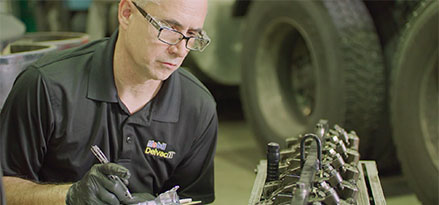Most fleet managers have one priority for their trucks – keeping them on the road for as long as they can. Implementing lubrication best practices is necessary to make this happen and will ultimately improve overall fleet management.
It starts with choosing the right lubricants for your fleet and following lubrication best practices that will keep everything working correctly and save you money in the long run. While selecting the right lubricants for your fleet can get complicated quickly, here are four tips from our Mobil Delvac™ experts that fleet managers should keep in mind to make the process as simple as possible.
- Use fuel economy-enhancing lubricants
- Consider extended life coolants
- Develop a service interval program
- Use diagnostic technologies to understand equipment performance
To help you implement these successfully and make the process as simple as possible, our Mobil experts have some questions you can ask yourself.
1. Use fuel economy-enhancing lubricants.
Can your oil maintain its fuel economy characteristics across your oil drain cycles or service intervals?
There are plenty of 10W-30 oils that have the CK-4 specification, but that does not necessarily mean that the oil will be able to preserve its oil drain intervals over its entire cycle. Fuel-economy-focused lubricants are designed with these considerations in mind and can provide superior overall protection for your engines. Mobil Delvac™ 1300 Super is designed with these considerations in mind and can provide superior overall protection for your engines.
What is your current fuel economy?
Despite the prevalence of 15W-40 engine oils throughout the industry, their fuel economy does not compare to 10W-30 engine oils, which can realize up to a 1% fuel economy, which for a fleet of 100 trucks can translate to meaningful savings. Today, 60% of truck stop customers are using 10W-30 CK-4 oils.
Have you ever considered using additized diesel fuels for more fuel economy benefits?
Additized diesel, by definition, contains components, such as detergents, aimed at improving one or more aspects of fuel performance. Diesel fuels formulated with detergents provide corrosion protection, help to reduce premature fuel filter plugging and keep fuel system components clean. By removing fuel injector deposits, detergents help combat the need for injector replacements due to deposit build up and also lower emissions, which can actually reduce stress placed on aftertreatment systems
2. Consider extended life coolants.
Are you still using an additized coolant conditioner?
Additized coolants have historically been the only solution to preserving coolant, but the introduction of extended life lubricants has changed the game.
Choosing a high-quality extended life coolant protects your engines over longer periods and reduces the amount of coolant-related maintenance to complete, which can result in significant cost and time savings. If you’re looking to keep your equipment on the road for the long haul, extended life coolant might be your answer.
How often are you changing your coolant?
Coolant plays a big role in the overall health of a fleet. Especially for smaller fleets, the expectation is for trucks to travel 160k kilometers per year. With Mobil Delvac™ Extended Life Coolant, fleets can use this product for the duration of its lifetime, extending beyond 1.6 million kilometers.
3. Develop a service interval program.
How much time is your fleet spending on greases?
For a fleet of 100 trucks, greasing can require as much as 100 hours of technician time per year, despite accounting for only 2% of lubricant demand.
Creating a proper greasing plan for vehicles is important; it can help optimize fleet uptime and ensure the correct amount of grease is being used. Extended life greases are most suitable for these needs.
By making these adjustments, you can save technicians up to 50% of their time so it can be re-allocated to more important tasks.
4. Use diagnostic technologies to understand equipment performance
How much of your downtime is related to coolant or fuel dilution issues?
There are always opportunities to use downtime more efficiently. The question is, how?
Implementing an efficient predictive maintenance strategy that analyzes the right data and provides quick, accurate insights can be critical to understanding potential fleet issues in a timely manner.
Diagnostic technologies, like Mobil℠ Lubricant Analysis, can help alleviate these concerns and lighten the load for your technicians. This analysis can provide engine diagnostics, overall fleet health, and real-time fault event notifications. With this program, for instance, we know that as many as 75% of alerts are related to coolant leaks.




